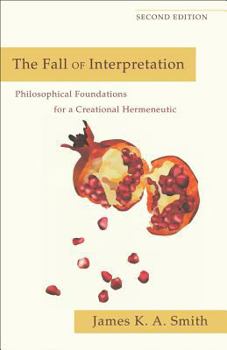The Fall of Interpretation: Philosophical Foundations for a Creational Hermeneutic
Many philosophers of the past century have focused on the problem of hermeneutics. Theologians have shared this concern because of their interest in interpreting biblical texts. As postmodern critics... This description may be from another edition of this product.
Format:Paperback
Language:English
ISBN:080103972X
ISBN13:9780801039720
Release Date:April 2012
Publisher:Baker Academic
Length:248 Pages
Weight:0.65 lbs.
Dimensions:0.8" x 5.4" x 8.4"
Age Range:18 years and up
Related Subjects
Philosophy Politics & Social Sciences Religion Religion & Spirituality Social PhilosophyCustomer Reviews
0 rating





